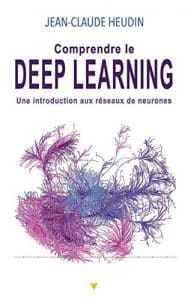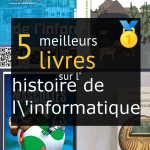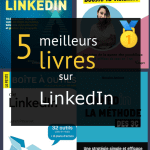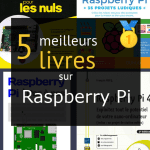Vous cherchez un livre sur le deep learning mais vous n’avez pas encore décidé lequel acheter?
Pour cette raison Les Livres a élaboré pour toi une liste des livres à lire absolument achetables online.
[acf field=”intro”]
Sommaire
- 1 🏆 Meilleurs livres sur le deep learning 2025: comparatif et avis
- 1.1 Quand la machine apprend: La révolution des neurones artificiels et de l'apprentissage profond
- 1.2 DÉCOUVRIR L'IA SUR L'ART ET LA CRÉATIVITÉ
- 1.3 Python sans détour: de l’addition au deep learning
- 1.4 Apprendre Python: Un Cours Accéléré sur la Programmation Python et Comment Commencer à l’utiliser pour Coder. Apprenez les Bases de Machine Learning et de l'analyse de Données
- 1.5 Python pour la Finance et le Trading algorithmique (2ème édition): Machine Learning, Deep Learning, analyse de séries temporelles, gestion des risques ... application en live trading sur MetaTrader™ 5
- 2 🥇Meilleuer livre sur le deep learning: l’incontournable
🏆 Meilleurs livres sur le deep learning 2025: comparatif et avis
Quand la machine apprend: La révolution des neurones artificiels et de l'apprentissage profond
- Ouvrage neuf. Disponible en stock.
- Le Cun, Yann (Auteur)
Python sans détour: de l’addition au deep learning
- Berger, Laurent (Auteur)
Python sans détour: de l'addition au deep learning est un livre écrit par Laurent Berger. Ce livre a pour objectif de guider les lecteurs dans l'apprentissage du langage de programmation Python, en commençant par les bases telles que l'addition et en progressant vers des concepts plus avancés tels que le deep learning. Le deep learning est une branche de l'intelligence artificielle qui vise à créer des réseaux de neurones artificiels capables d'apprendre et de résoudre des problèmes complexes. Ce livre explique les principes et les techniques du deep learning et fournit des exemples de code Python pour aider les lecteurs à mettre en pratique leurs connaissances. En résumé, Python sans détour: de l'addition au deep learning est un guide pratique pour apprendre Python et découvrir le domaine du deep learning. Il convient aux débutants en programmation Python ainsi qu'aux personnes intéressées par les applications de l'intelligence artificielle.
Apprendre Python: Un Cours Accéléré sur la Programmation Python et Comment Commencer à l’utiliser pour Coder. Apprenez les Bases de Machine Learning et de l'analyse de Données
- Parker, Damon (Auteur)
"Apprendre Python: Un Cours Accéléré sur la Programmation Python et Comment Commencer à l’utiliser pour Coder. Apprenez les Bases de Machine Learning et de l'analyse de Données" de Parker, Damon est un livre qui propose un cours accéléré sur la programmation Python, en mettant l'accent sur la façon de commencer à coder avec Python. Le livre se concentre également sur l'apprentissage des bases du Machine Learning et de l'analyse de données en utilisant Python. Il couvre les concepts de base de la programmation Python, tels que les variables, les boucles, les fonctions, les listes et les dictionnaires. En plus de cela, le livre explore comment utiliser Python pour l'analyse de données en utilisant des bibliothèques telles que NumPy et Pandas. Il plonge également dans les bases du Machine Learning en utilisant des packages tels que Scikit-Learn. Ce livre est idéal pour les débutants en programmation Python qui souhaitent apprendre les bases du codage ainsi que les principes fondamentaux de l'analyse de données et du Machine Learning. Il fournit une introduction pratique et étape par étape à Python et offre des exemples de code clairs et concis pour illustrer chaque concept. Que vous soyez un étudiant, un ingénieur ou un professionnel cherchant à élargir vos compétences, "Apprendre Python: Un Cours Accéléré sur la Programmation Python et Comment Commencer à l’utiliser pour Coder. Apprenez les Bases de Machine Learning et de l'analyse de Données" vous aidera à maîtriser les bases de Python et à commencer à utiliser Python pour coder et analyser des données.
Python pour la Finance et le Trading algorithmique (2ème édition): Machine Learning, Deep Learning, analyse de séries temporelles, gestion des risques ... application en live trading sur MetaTrader™ 5
- Inglese, Lucas (Auteur)
La deuxième édition du livre "Python pour la Finance et le Trading algorithmique" de Lucas Inglese se concentre sur l'utilisation de Python dans le domaine de la finance et du trading. Le livre couvre plusieurs sujets avancés tels que le Machine Learning, le Deep Learning, l'analyse des séries temporelles et la gestion des risques. L'auteur commence par expliquer les bases de Python et comment l'utiliser pour analyser les données financières. Il passe ensuite à des sujets plus avancés, en présentant différentes techniques de Machine Learning et de Deep Learning utilisées dans la finance. L'auteur explique comment utiliser ces techniques pour prédire les mouvements du marché, détecter des modèles dans les données et générer des signaux de trading. Le livre offre également des conseils sur la gestion des risques, en expliquant comment calculer et gérer les risques associés aux transactions financières. L'auteur présente des outils avancés pour mesurer et réduire les risques, tels que la Value at Risk (VaR) et l'Expected Shortfall. Une partie importante du livre est consacrée à l'utilisation de Python dans le trading en temps réel sur la plateforme MetaTrader™ 5. L'auteur explique comment utiliser l'API de MetaTrader™ 5 pour connecter Python à la plateforme et envoyer des ordres de trading en temps réel. Il montre également comment analyser les données en temps réel et prendre des décisions de trading basées sur ces données. En résumé, "Python pour la Finance et le Trading algorithmique" est un livre avancé qui présente les techniques de Machine Learning et de Deep Learning utilisées dans la finance et le trading. Il offre également des conseils sur la gestion des risques et explique comment utiliser Python pour le trading en temps réel sur la plateforme MetaTrader™ 5.
🥇Meilleuer livre sur le deep learning: l’incontournable
Sélectionnez le meilleur livre sur le deep learning peut être plus compliqué que vous croyez. Cela dit, basé sur avis des lecteurs, Quand la machine apprend: La au prix de 23,90 EUR est le meilleur livre disponible sur Amazon :

J’ai transformé ma passion pour les livres en un site Web, dans l’espoir d’aider les gens à trouver les meilleures lectures.










